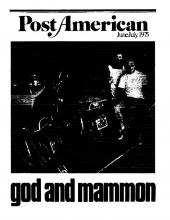The reality of the war we wage today is that we face problems of crime and violence, famine, mental illnesses such as racism, an unstable economy that depletes our environment and crushes the poor, poor housing, governmental corruption, boredom and meaninglessness, and the erosion of the family. And the fact is that we, as a society, have found no solutions -- not one. Over the past few years our vast networks of public relations and promotional advertising have been trying to convince us that solutions are at hand or just down the road a little further. But the crime rates still climb, and the number of people starving in this country is increasing. In my county in Mississippi, where more than 50 percent of the housing is substandard, construction is down by two-thirds, people are losing their jobs, and a lot of black and a few white babies are dying because of poor health care. In both urban and rural areas, desperate problems go without solutions.
I say there are no solutions to emphasize my belief that traditional solutions to the problems facing our country are totally inadequate. In an address he gave in November 1974, Sen. Mark Hatfield explained that there are up to “64 different factors which, singly and in combination, can affect food production and demand,” and that “any effort that addresses only one of these factors and ignores the others will fail.”
I think that is the nature of the war which we are called to wage in our communities. Traditional solutions are not effective because they are not comprehensive enough in scope. In the true sense of the word, they are not “radical” enough, they do not attack the roots of problems. Our society sees problems individually rather than as symptoms of some very deep and cancer-like illness affecting our whole system. We are unable to deal with the roots of problems because we are unable to deal with or change basic human values.
Read the Full Article

